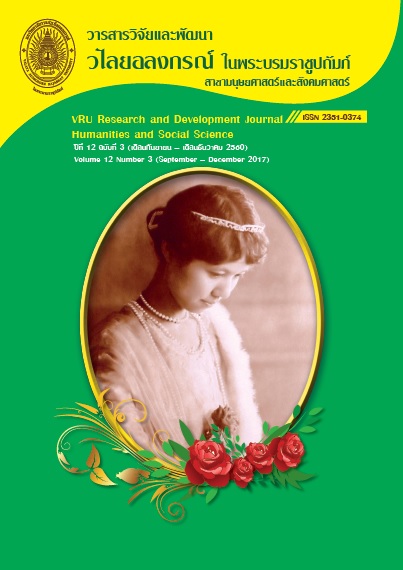กลยุทธ์การจัดการท่องเที่ยวโดยชุมชนแบบยั่งยืนในจังหวัดนครราชสีมา
Main Article Content
Abstract
การวิจัยนี้มีวัตถุประสงค์ เพื่อศึกษาความสามารถในการจัดการท่องเที่ยวโดยชุมชนในจังหวัดและ นำเสนอกลยุทธ์การจัดการท่องเที่ยวโดยชุมชนในจังหวัดนครราชสีมาเพื่อความยั่งยืนในอนาคต การวิจัยนี้เป็นการวิจัยเชิงคุณภาพ โดยการออกแบบการวิจัยจากกระบวนทัศน์สร้างสรรค์นิยม(Constructivism) ด้วยยุทธศาสตร์การสร้างทฤษฎีฐานราก(Grounded Theory) ผู้วิจัยเก็บข้อมูลจากการสัมภาษณ์เชิงลึก (In-dept Interview) ด้วยแบบสัมภาษณ์กึ่งโครงสร้าง จากผู้ให้ข้อมูลหลัก(Key Informants) โดยเลือกสุ่มแบบเจาะจง(Purposive Sampling) จำนวน 3 กลุ่ม ได้แก่ 1)กลุ่มท่องเที่ยวโดยชุมชนในจังหวัดนครราชสีมาที่มีการจัดที่พักแบบโฮมสเตย์ในชุมชน 5 กลุ่ม 2) หัวหน้า/ตัวแทนหน่วยงานภาครัฐที่มีบทบาทในการกำกับดูแลและสนับสนุนการท่องเที่ยวโดยชุมชน และ 3) นักวิชาการที่มีประสบการณ์ด้านการท่องเที่ยวโดยชุมชนผลการวิจัยพบว่า
1) ความสามารถในการจัดการท่องเที่ยวโดยชุมชน พบว่า กลุ่มท่องเที่ยวชุมนมีผู้นำกลุ่มที่มีความมุ่งมั่น มีความรู้ความสามารถและความเข้าใจบริบทในการจัดการท่องเที่ยว กลุ่มท่องเที่ยวชุมชนมีการสร้างความร่วมมือทั้งในระดับแนวตั้งและแนวนอน แต่เป็นเพียงการมีส่วนร่วมในระดับของการปฏิบัติ ยังขาดการสร้างความร่วมมือในการวางแผนการจัดการท่องเที่ยวชุมชน นอกจากนี้กลุ่มท่องเที่ยวชุมชนมีความสามารถในการใช้สื่อและช่องทางในการประชาสัมพันธ์ที่หลากหลายแต่ทำอย่างไม่ต่อเนื่อง จากการศึกษายังพบว่าทุกกลุ่มมีแนวทางในการจัดสรรรายได้ที่เป็นธรรมแก่คนในชุมชนทั้งทางตรงและทางอ้อม ถึงแม้ว่ารายได้จากการท่องเที่ยวชุมชนอาจจะไม่มากพอต่อการดำรงแต่ชาวบ้านก็ยอมรับเรื่องการจัดการท่องเที่ยวชุมชน เพราะทำให้เกิดความภาคภูมิใจในการได้นำเสนอวิถี วัฒนธรรมและแหล่งท่องเที่ยวในชุมชนของตน อย่างไรก็ตามในการจัดการท่องเที่ยวชุมชน ชาวบ้านยังให้ความสำคัญกับการดูแลทรัพยากรธรรมชาติและสิ่งแวดล้อมในบริเวณชุมชนของตน อีกทั้งกลุ่มยังตระหนักถึงการรักษาวิถีชีวิตของชุมชนให้คงอยู่ แต่ปัญหาหนึ่งที่หลายชุมชนประสบก็คือ การขาดคนสืบทอดวัฒนธรรมและภูมิปัญญาท้องถิ่น
2) ผู้วิจัยได้วิเคราะห์และนำเสนอกลยุทธ์การท่องเที่ยวโดยชุมชนแบบยั่งยืนในจังหวัดนครราชสีมา ตามกรอบของรูปแบบการท่องเที่ยวอย่างยั่งยืน SEE Model ได้แก่ มิติด้านสังคม-วัฒนธรรม (Social-Culture) มิติด้านเศรษฐกิจ(Economic) และมิติด้านสิ่งแวดล้อม(Environmental)
The objectives of this study were: 1) to investigate the ability in operating community-based tourism in Nakhon Ratchasima; and 2) to introduce the strategies for managing sustainable community-based tourism in the future. This qualitative research was designed based on the constructivism approach with the Grounded Theory strategy. The data were collected from in-depth interviews using semi-structured interviews with three groups of purposively sampled key performants, including: 1) five members of community-based tourism groups in Nakhon Ratchasima who provided home-stay style tourism in the community; 2) administrators/representatives of government organizations who take roles in monitoring and supporting community-based tourism; and 3) scholars who were experts in community-based tourism. The results are as follows.
1)The results on the ability to operate community-based tourism showed that the community-based tourism groups had determined leaders with the knowledge, ability, and understanding of tourism contexts. The groups developed collaboration at both the vertical and horizontal levels, but mostly at the operation levels. The groups still lacked cooperation in planning the community-based tourism. Moreover, the groups used a variety of media and promotional channels, though not continuously. The results also showed that all the groups had ways of fair allocation of incomes to all participants in the community both directly and indirectly. Although the incomes were not adequately high, the community members still accepted community-based tourism because they were proud of having chance to present their community’s valuable life-styles, culture, and tourist attractions. Additionally, in operating community-based tourism the groups were aware of the importance of conserving nature and environment of the community, as they realized the sustainability of maintaining the community’s life-styles. One of the problems the groups faced was the lack of young generation to continue their culture and local wisdoms.
2)The researcher introduces strategies for sustainable operation of community-based tourism in Nakhon Ratchasima based on the framework of sustainable tourism SEE Model, which consists of social-cultural, economic, and environmental dimensions.
Article Details
ลิขสิทธิ์บทความวิจัยที่ได้รับการตีพิมพ์เผยแพร่ในวารสารมนุษยศาสตร์และสังคมศาสตร์ วไลยอลงกรณ์ ในพระบรมราชูปถัมภ์ ถือเป็นกรรมสิทธิ์ของคณะมนุษยศาสตร์และสังคมศาสตร์ มหาวิทยาลัยราชภัฏวไลยอลงกรณ์ ในพระบรมราชูปถัมภ์ ห้ามนำข้อความทั้งหมดหรือบางส่วนไปพิมพ์ซ้ำ เว้นแต่จะได้รับอนุญาตจากมหาวิทยาลัยเป็นลายลักษณ์อักษร
ความรับผิดชอบ เนื้อหาต้นฉบับที่ปรากฏในวารสารมนุษยศาสตร์และสังคมศาสตร์ วไลยอลงกรณ์ ในพระบรมราชูปถัมภ์ เป็นความรับผิดชอบของผู้นิพนธ์บทความหรือผู้เขียนเอง ทั้งนี้ไม่รวมความผิดพลาดอันเกิดจากเทคนิคการพิมพ์


